-
Chelyabinsk meteor explosion a "wake-up call," scientists warn
Three new studies have revealed details of the meteor that exploded above Russian city, Chelyabinsk, in February this year. Their findings provide information about the meteor’s origin, trajectory, power and damage by the airburst (the shock wave that travelled through the air from the explosion). These findings may help to refine theoretical models about the likely frequency of such events, the potential damage they could cause and hazard mitigation strategies needed for planetary protection.
-
-
Ann Arbor to offer residents networked, driverless cars by 2021
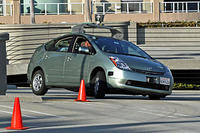
By 2021, Ann Arbor could become the first American city with a shared fleet of networked, driverless vehicles. This is the goal of the Mobility Transformation Center, a cross-campus University of Michigan initiative that also involves government and industry representatives.
-
-
DoD ends ambitious blimp program
The Department of Defensehas decided to end its Long Endurance Multi-Intelligence Vehicle (LEMV) project.The blimp was supposed to fly for as long as three weeks at a time, gather intelligence using 2,500 pounds worth of the most advanced cameras, sensors, and other intelligence technology. Operating at an altitude of 20,000 feet, the airship was designed to withstand enemy fire with its blend of fabrics, including kevlar. The Pentagon spent $297 million on the airship, but last month sold it back to one of the contractors which built it for $301,000.
-
-
Wildfire science returns to California’s Rim Fire
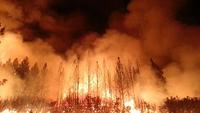
The challenging job of managing wildfires rests with other agencies, but the U.S. Geological Survey (USGS) provides the underlying science for sound land management decisions, before, during, and after wildfires. The USGS role studying natural hazards such as floods, landslides, earthquakes, and volcanoes is well known, but fewer people are aware of the USGS scientific work in major wildfire events, which are one of the most regular and sometimes most devastating natural hazards in the West.
-
-
War experiences harden group alliances
War is hell, and according to new research, experiencing its horrors can cause people to have a greater affinity for members of their own group, particularly if they are exposed to warfare in early adulthood or later in childhood. The researchers say that these effects have the potential to explain why conflict sometimes leads to cycles of war and sometimes stimulates nation-building in its wake.
-
-
Safe long-term CO2 storage possible

Since 2004, the German Research Centre for Geosciences (GFZ) has led an international research network to investigate the geological storage of the greenhouse gas (CCS, for carbon capture and storage). GFZ’s scientists say that their work at the Ketzin site, 40 km west of Berlin, has shown that geological CO2 storage on a pilot scale can be done safely and reliably.
-
-
Wireless device converts wasted energy into electric power
Using inexpensive materials configured and tuned to capture microwave signals, researchers have designed a power-harvesting device with efficiency similar to that of modern solar panels. The device wirelessly converts the microwave signal to direct current voltage capable of recharging a cell phone battery or other small electronic device.
-
-
Developing robots for bridge inspection, mine rescue with NSF grants

In 2011, at Carnegie Mellon University, President Barack Obama announced the National Robotics Initiative. The National Science Foundation announced it has awarded a total of more than $7 million to Carnegie Mellon researchers in the latest round of grants for the initiative — a multi-agency effort to develop robots that can work with humans to extend and augment human skills. Researchers are developing robots for bridge inspection, mine rescue, and aid for the blind.
-
-
Scientists: we should prepare for hell and high water

An international team of climate and social scientists say a new approach to climate preparedness is essential to help people adjust to coming changes. As climate-driven changes get more pronounced, people everywhere will have to adjust. In this week’s issue of the journal Science, an international group of researchers urge the development of science needed to manage climate risks and capitalize on unexpected opportunities.
-
-
Designing better toilet bowls
Although we do not often think about it, fluid dynamics touches almost every aspect of our lives, from a billowing breeze that buffets a flag, to swirling river currents that shape canyons to the surging blood that sustains our lives. One of the basest of bodily functions – urination — is governed primarily by the equations of fluid motion. Scientists (they call themselves “wizz-kids”) hope to create an optimization function to find the ideal approach for urinal usage.
-
-
Reducing volume of nuclear waste by 90 percent possible
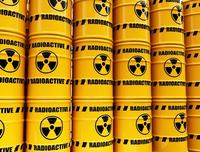
Engineers have developed a way significantly to reduce the volume of some higher activity wastes, which will reduce the cost of interim storage and final disposal. The researchers have shown that mixing plutonium-contaminated waste with blast furnace slag and turning it into glass reduces its volume by 85-95 percent. It also effectively locks in the radioactive plutonium, creating a stable end product.
-
-
Water shortage hobbles expansion of shale gas drilling
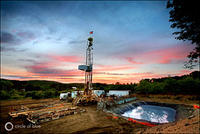
Many point to the large reserves of shale gas as promising U.S. energy independence in the near future. Extracting shale gas, however, requires huge amounts of water, and growing water shortages have already led to conflicts over water use between shale gas developers and farmers. Such conflicts are only going to intensify.
-
-
UAV developer CyPhy Works raises $7 million to build flying robots
Danvers, Massachusetts-based CyPhy Works, a developer of advanced UAVs, the other day announced the close of a $7 million financing round led by Lux Capital, with participation from General Catalyst Partners, Felicis Ventures, and several undisclosed angel investors. As part of the financing, Lux Capital Partner Bilal Zuberi will join the CyPhy Works board of directors. The company says it targets 24/7 “persistent” operations.
-
-
“Hybrid” nuclear plants could make a dent in carbon emissions
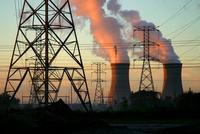
Combining nuclear with artificial geothermal, shale oil, or hydrogen production could help slow climate change, study shows. MIT’s Charles Forsberg proposes marrying a nuclear powerplant with another energy system, which he argues could add up to much more than the sum of its parts.
-
-
Colleges incorporate homeland security into their curriculum
The establishment of the Department of Homeland Security(DHS) in the aftermath of the 9/11 attacks has made “homeland security” a common phrase and a flourishing industry in the United States. Service providers and manufacturers have benefited by introducing devices and offerings to protect, detect, and react to natural and man-made disasters. Colleges and universities have also begun to incorporate homeland security into their curriculum.
-
More headlines
The long view
New Technology is Keeping the Skies Safe
DHS S&T Baggage, Cargo, and People Screening (BCP) Program develops state-of-the-art screening solutions to help secure airspace, communities, and borders
Factories First: Winning the Drone War Before It Starts
Wars are won by factories before they are won on the battlefield,Martin C. Feldmann writes, noting that the United States lacks the manufacturing depth for the coming drone age. Rectifying this situation “will take far more than procurement tweaks,” Feldmann writes. “It demands a national-level, wartime-scale industrial mobilization.”
How Artificial General Intelligence Could Affect the Rise and Fall of Nations
Visions for potential AGI futures: A new report from RAND aims to stimulate thinking among policymakers about possible impacts of the development of artificial general intelligence (AGI) on geopolitics and the world order.
Smaller Nuclear Reactors Spark Renewed Interest in a Once-Shunned Energy Source
In the past two years, half the states have taken action to promote nuclear power, from creating nuclear task forces to integrating nuclear into long-term energy plans.
Keeping the Lights on with Nuclear Waste: Radiochemistry Transforms Nuclear Waste into Strategic Materials
How UNLV radiochemistry is pioneering the future of energy in the Southwest by salvaging strategic materials from nuclear dumps –and making it safe.
Model Predicts Long-Term Effects of Nuclear Waste on Underground Disposal Systems
The simulations matched results from an underground lab experiment in Switzerland, suggesting modeling could be used to validate the safety of nuclear disposal sites.
